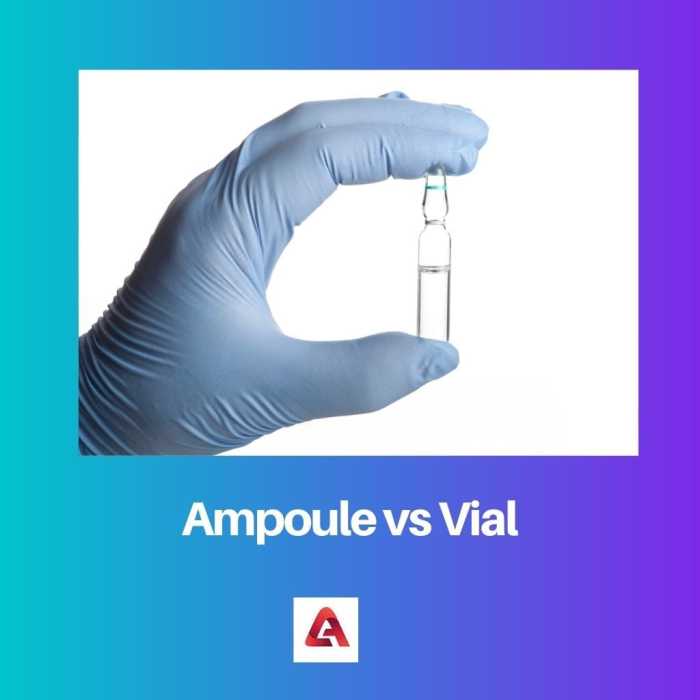An ampoule is an individual dose of a substance, typically a medication or vaccine, sealed in a small glass container. Ampoules are commonly used in the medical and scientific fields for storing and delivering precise doses of various substances.
This article delves into the definition, construction, uses, advantages, disadvantages, storage, handling, and alternatives to ampoules, providing a comprehensive overview of these essential containers in various applications.
Definition and Purpose
An ampoule is a sealed glass container that holds a single dose of a liquid or powder substance. It is typically used to store and deliver medications, vaccines, or other sterile solutions.
Ampoules are designed to maintain the sterility and potency of their contents. They are typically made of clear or amber glass to protect the contents from light and moisture.
Materials and Construction
Ampoules are typically made of borosilicate glass, which is resistant to heat and chemicals. The glass is molded into a cylindrical shape with a narrow neck and a sealed tip.
The manufacturing process of ampoules involves several steps, including:
- Melting the glass and forming it into a tube
- Cutting the tube into individual ampoules
- Shaping the ampoules by heating and blowing
- Annealing the ampoules to relieve any stresses in the glass
- Inspecting and testing the ampoules for defects
Ampoules come in various shapes and sizes, depending on their intended use. Some common shapes include:
- Straight-sided ampoules
- Pear-shaped ampoules
- Vial-shaped ampoules
Uses and Applications

Ampoules are widely used in various fields, including:
- Medicine:Ampoules are used to store and deliver medications, such as antibiotics, vaccines, and pain relievers.
- Scientific research:Ampoules are used to store and dispense reagents and other chemicals used in experiments.
- Industrial applications:Ampoules are used to store and dispense chemicals and other substances used in manufacturing processes.
Advantages and Disadvantages: An Ampoule Is An Individual Dose Of
Advantages of using ampoules include:
- Sterility:Ampoules provide a sterile environment for storing and delivering medications.
- Protection from light and moisture:The glass construction of ampoules protects their contents from light and moisture, which can degrade the potency of medications.
- Single-dose packaging:Ampoules are designed to contain a single dose of a medication, which reduces the risk of medication errors.
Disadvantages of using ampoules include:
- Fragility:Ampoules are made of glass, which is fragile and can easily break.
- Difficulty in opening:Opening ampoules requires specialized tools or techniques, which can be challenging for some users.
- Cost:Ampoules are more expensive than other dosage forms, such as tablets or capsules.
Storage and Handling

Proper storage and handling of ampoules are essential to maintain their sterility and integrity.
Storage conditions for ampoules include:
- Store ampoules in a cool, dry place.
- Protect ampoules from light and moisture.
- Do not freeze ampoules.
Precautions when handling ampoules include:
- Use a file or ampoule opener to score and break the neck of the ampoule.
- Handle ampoules with care to avoid breakage.
- Dispose of used ampoules properly by breaking them and discarding them in a sharps container.
Alternatives to Ampoules

There are several alternative dosage forms that can be used instead of ampoules, including:
- Vials:Vials are similar to ampoules but have a larger opening and are typically used for larger volumes of liquid.
- Prefilled syringes:Prefilled syringes contain a single dose of a medication and are ready to inject.
- Unit-dose packets:Unit-dose packets contain a single dose of a medication in a foil or plastic packaging.
The choice of dosage form depends on factors such as the stability of the medication, the desired route of administration, and the patient’s needs.
Commonly Asked Questions
What materials are ampoules made of?
Ampoules are typically made of borosilicate glass, which is known for its resistance to thermal shock and chemical reactions.
How are ampoules manufactured?
Ampoules are manufactured using a blow-and-fill technique, where molten glass is blown into a mold to create the desired shape, and then filled with the substance.
What are the advantages of using ampoules?
Ampoules offer several advantages, including precise dosage, protection from contamination, and ease of transportation and storage.